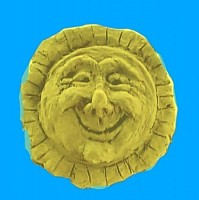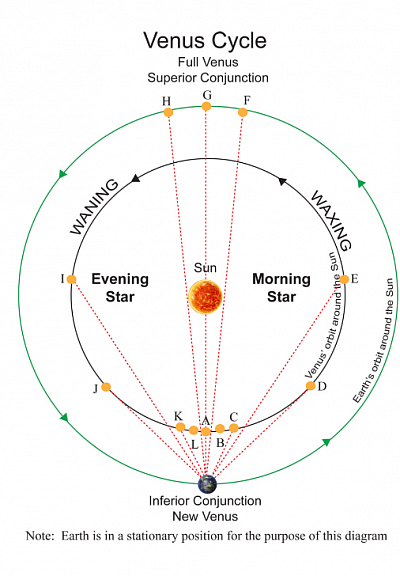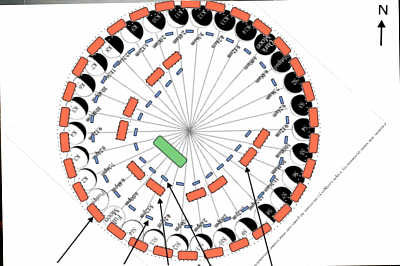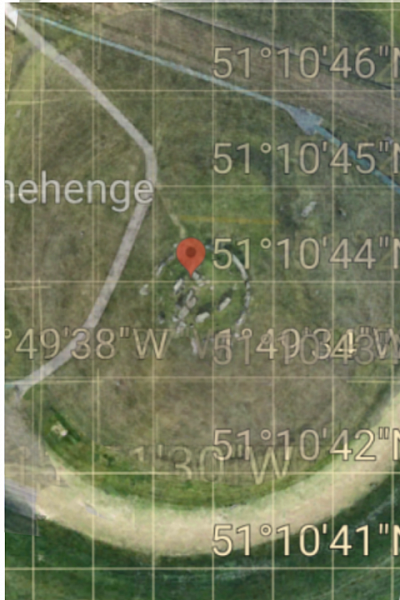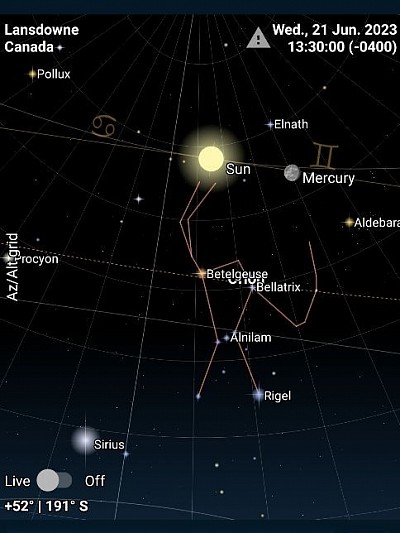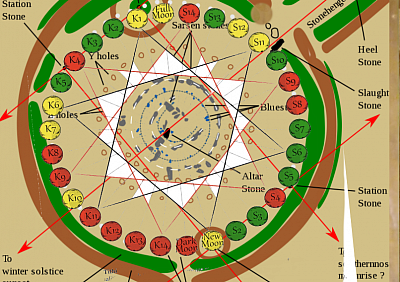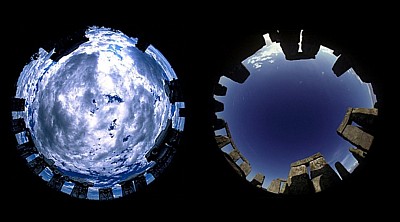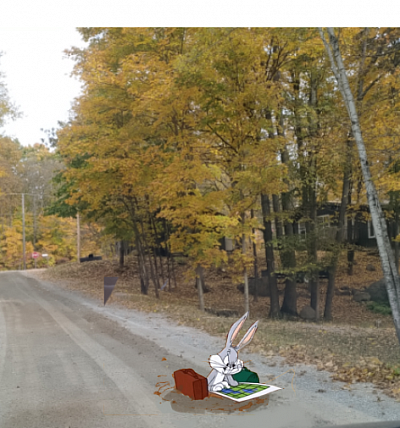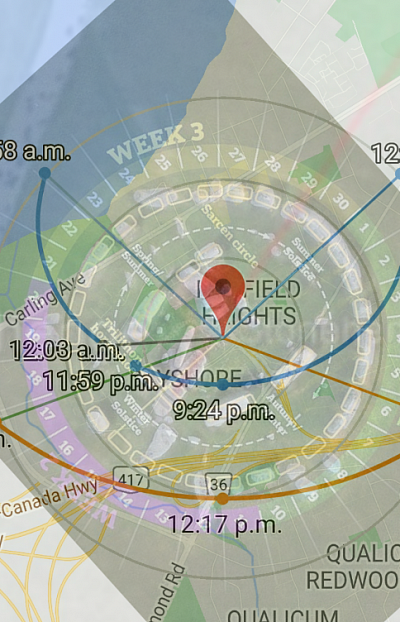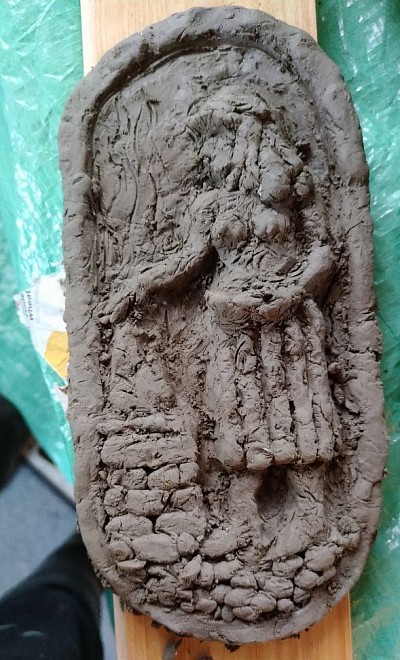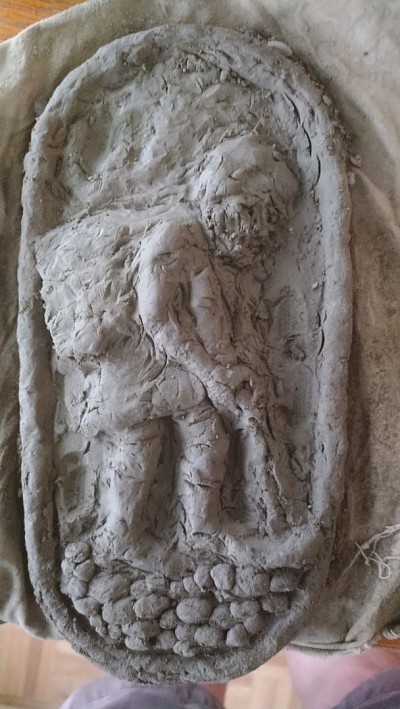A Blog about Henge-keeping
Build your own Henge.
At last I've figured out what the Sarsen Horse Shoe is for.
Size and Distance of the Sarsen Circle
The diameter of the Sarsen Circle is 108 feet and the circumference is 339 feet
The Purpose of the Sarsen Circle.
Once the numbers had been worked out with the Aubrey Hole Circle, the Stonehenge builders decided to consolidate their design. They did this by making the Sarsen Stones eight degrees wide then they placed the stones four degrees apart.
Another Discovery
To I kept exploring. I found another key to understanding the Aubrey Holes. I found a diagram of the orbit of the earth and moon around the sun. I copied the diagram in Photoshop and overlaid the diagram with different coloured copies turned to represent the succeeding years. Each new year is adjusted to sync with the phase of the Moon. The Aubrey holes always seemed to be in groups of two or crowded into groups of five or more. Each two holes mark the 10.88 days difference between the Solar and Lunar Year. It was very confusing for the longest time but I figured it out. At the end of the year you go past the second position and start the new year at the third position. This way it takes three positions to complete the year which shows that the Aubrey Holes count the 18.?? year lunar cycle.
The Aubrey Holes Mystery Solved
After much thought and comparisons of different systems, I have decided that my original idea for explaining the Aubrey Holes is the winner. At least for use in Stickhenge. The 56 Aubrey Holes represent the entire year, 365 days. The number of Aubrey Holes is equivalent to measurement of the footprint of the Sarsen Circle. Each Sarsen upright stone is 8° wide with 4° between each stone. This results in three equal divisions of 4° which add up to 12°. The Aubrey Holes have this same 3x4 spacing. With six equal divisions between each, the total is 365. This is because 56 can be divided like so: 56÷2=28 28÷2=14 14÷2=7.
The story of The Skywalker
This coming Summer Solstice, the constellation we call Orion will rise with the Sun in one hand and Mercury in the other. In Celtic mythology this character is Lugh Lamfadagh, or Lugh of the Long Arm who is the Celtic God of Light. In the story I first read, Lugh's weapon was a sling, which Lugh used to slay the Formorian Demigod Balor in the Second Battle of Magh Tiured. Balor could destroy anything he looked at with his single great eye. Lugh threw a great stone through Balor's eye and won the battle. Now Lugh walks across the sky swinging his sling over his head. In our period Lugh rises with the Summer Solstice Sun. Sometimes he swings one or more planets, which orbit the Sun. With this perspective it's easy to see where the centre of the Solar System is.
What is a Station Stone?
A Station can be, if connected to the Moon, an astrological position that is also referred to as a Mansion or House.
The Contrarian Society
I was watching a show about Stonehenge on "Nova". Once again British archaeologists were going out of their way to claim that Stonehenge has nothing to do with astronomy, apart from the solstice alignments. Why do they ignore the mathematics? They claim that Stonehenge doesn't align with anything other than the Solstices. That is odd. Does that mean a compass or a protractor or maybe a Sextant don't align with anything either? Maybe the lines of latitude and longitude don't align with anything. I guess we live in a funny world where nothing works.
I was listening to a debate on the existence of Time and Space, that was academic to the point of the ridiculous. Nobody was looking at the practiicallity of time and space, such as, how they get to work on time or how they got to the debate on time and how they know that they won't be debating forever.Stickhenge is a study of time and space. I realize that the day begins at sunrise and ends at sunset. The Sun rises at a place on the eastern horizon that is specific to that day. The Sun also rises to a maximum altitude at Noon that is specific to the day. Finally the Sun sets at a place on the western horizon specific to the day.. Of course everything about these facts came from oservation and measurement. There is not much imagination needed to see and record all of this information. It's hardly a construct of the human mind. Can time and space exist without a human observer? I think yes. Time and space are getting along quite well, in spite of most of humanity noticing, caring or knowing what goes on in the sky each and every day.
The Major Lunar Standstill, January 2025.
On this Major Standstill the Moon follows the same path as the Summer Solstice.
